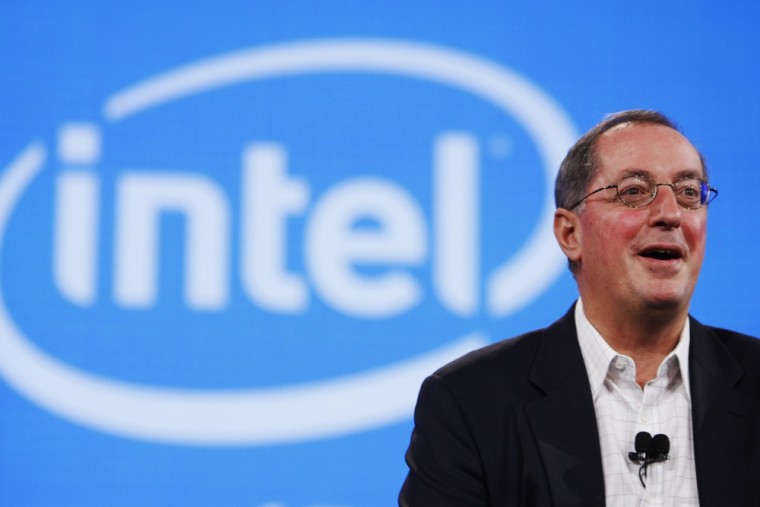Intel's Chief Executive Officer Paul Otellini will retire sooner than expected and the top chipmaker said it may name an outsider for the position for the first time to steer a difficult transition toward mobile computing.
Intel, which has selected chief executives from within its own ranks throughout its 45-year history, said it would consider both internal and external candidates in a transition expected to last six months.
Otellini will retire in May at the age of 62, earlier than the company's mandatory retirement age for CEOs of 65. Intel's fifth chief executive, Otellini has worked at the company for nearly 40 years and became CEO in 2005.
Chairman Andy Bryant said in an interview with Barron's on Monday he was surprised last week when Otellini told him he planned to retire and that he tried to get Otellini to stay. He told the financial publication it was good governance to consider external candidates in the selection of a new CEO but also pointed to five Intel insiders as "fine" executives.
"We do have big issues in front of us, moving to the tablet and phone markets, and he was ready to let the next generation lead those battles," Bryant said.
Intel, whose processors are dominant in personal computers, has been slow to expand into the fast-growing mobile industry, where Apple Inc's iPads and iPhones and other popular mobile devices use competing technology from Britain's ARM Holdings.
"We all know that everyone is using smartphones and tablets now. It's the era of Intel versus ARM, so it may be good to come in with some fresh blood and a new perspective," Evercore analyst Patrick Wang said.
Intel company said it would promote three executives to become executive vice presidents: Renee James, who is in charge of Intel software; Brian Krzanich, who is chief operating officer and oversees manufacturing; and Stacy Smith, chief financial officer and director of corporate strategy.
Smith, well-known by Wall Street, and Krzanich have in the past been viewed as potential CEOs.

"There is a comfort level with Stacy (Smith)," said Williams Financial analyst Cody Acree. There'd be more continuity under his leadership, he said.
Krzanich, a three-decade Intel veteran, made a name for himself improving the efficiency of the chipmaker's cutting-edge factories. He was promoted to chief operating officer last March, effectively throwing him in the running for the post of CEO.
Analysts said James' focus on software instead of hardware made her less likely to be promoted to CEO.
Bryant pointed to Krzanich, Smith and James, as well as Intel Capital head Arvind Sodhani and Dadi Perlmutter, head of Intel's push into mobile, as important executives for Intel's future, according to Barron's.
END OF AN ERA
Since it was founded in 1968, Intel has promoted CEOs from within. But the increasing belief that the "PC era," which Intel helped create, may be drawing to a close could explain Intel's willingness to look for outside candidates, analysts said.
"Previous CEO transitions have all involved carefully groomed internal candidates. But if Intel's board is now looking externally -- to bring in new skills -- that would explain the lack of a named successor and length of time in transition," said Longbow Research analyst JoAnne Feeney.
With economic growth slowing in China and struggling in Europe and the United States, global PC shipments are expected to decline slightly this year, the first annual drop since 2001.
The top chipmaker is currently running its factories at less than 50 percent of capacity, redirecting unused space and equipment to be used for more cutting-edge production lines still being built.
The Santa Clara, California-based company has long been king of the PC chip market, particularly through its historic "Wintel" alliance with Microsoft Corp, which led to breathtakingly high profit margins and an 80 percent market share.
But it has struggled to adapt its powerful PC processors for battery-powered smartphones and tablets. Its market share for smartphones is less than 1 percent, trailing Qualcomm Inc, Samsung Electronics Co Ltd, ARM Holdings Plc and others.
That leads some investors, who are already concerned about a lackluster global economy, to ask if Intel's supremacy has come to an end and whether the company's potential for profit and revenue growth may be limited.
Intel's shares close up 0.3 percent at $20.25 in Nasdaq trading on Monday.